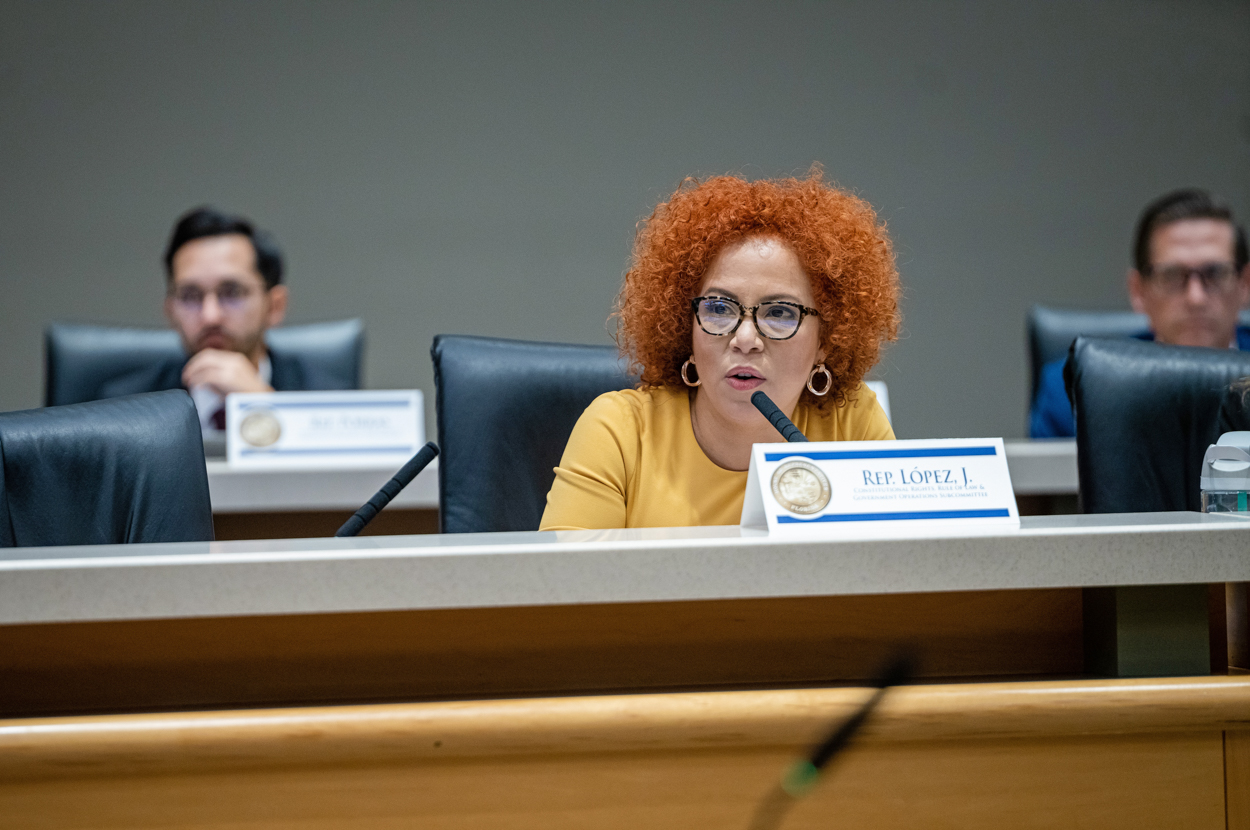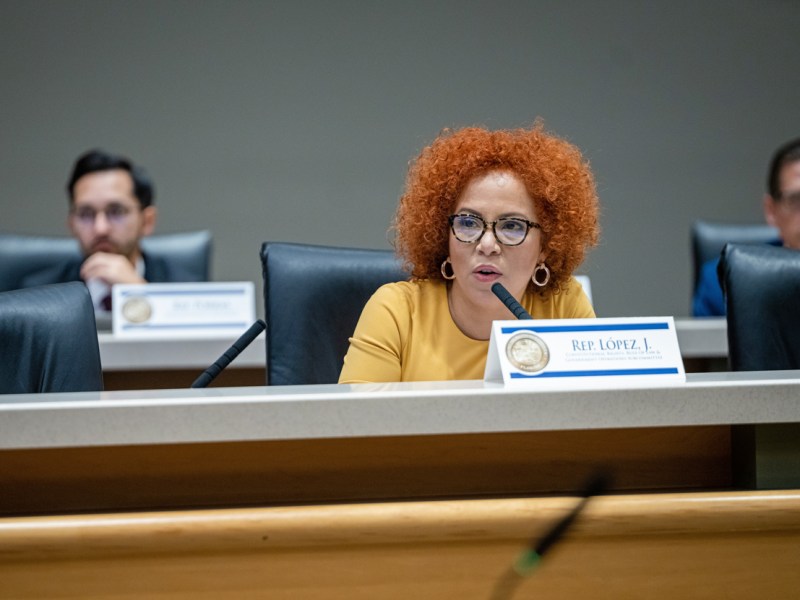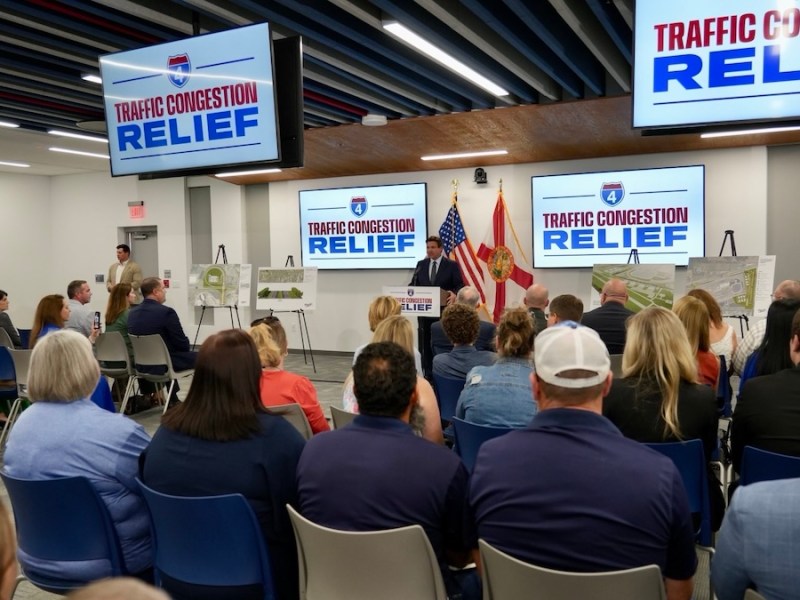Two Orlando-area Democratic lawmakers have filed identical bills for consideration during the 2026 state legislative session that would strengthen anti-discrimination protections for victims and survivors of domestic violence and stalking.
Under the proposed legislation (HB 107/SB 142), Florida landlords would be strictly prohibited from evicting survivors of domestic violence because of the abuse or violence committed against them. Survivors, with accompanying evidence, would also be allowed to terminate a rental agreement early in order to leave an abusive home situation.
“What we want is to protect the survivor’s safety and dignity,” Florida Rep. Johanna Lopez, a survivor of domestic violence herself, told Orlando Weekly.
Lopez, the House bill sponsor, said that when she had to flee her home due to an abusive husband, she was lucky to have the support of friends and family. But not everyone in that situation has social support or the financial resources to escape an abusive situation without facing the risk of financial ruin.
Lopez said that, even though she was able to find a place to stay after fleeing her husband, doing so still left her without a stable place to call home.
“I was homeless,” she said. “Living with friends, with my four children, and I was a teacher.”
A former educator working in the public school system, Lopez said she shared a bank account with her husband, which complicated efforts to flee the abuse. Abusive partners, she explained, can hold a shared bank account or shared housing over a victim’s head to control, manipulate, or keep the person by their side.
“I was blessed to have colleagues that were explaining to me what to do and supporting me,” said Lopez, who initially struggled with navigating the process of filing an injunction for protection — a.k.a. a restraining order — to protect herself.
“What we want is to protect the survivor’s safety and dignity.”
Housing instability, or the risk of homelessness, can prevent individuals from leaving an abusive situation, and is more common among victims of abuse. Research has found that women, specifically, who experience intimate partner violence are four times more likely to experience homelessness than those who do not.
But Michelle Sperzel, CEO of Harbor House — Orange County’s certified domestic violence shelter — emphasized, too, that anyone can be a victim.
“Domestic violence can impact anybody,” she told Orlando Weekly. It can impact any age group, gender and “it doesn’t see color or socioeconomic [status].”
According to the Florida Department of Children and Families, more than 100,000 crimes of domestic violence were reported to Florida law enforcement agencies in 2020 alone. More than 10 million people in the U.S. experience domestic violence annually.
What protections exist for domestic violence survivors currently?
Survivors of domestic violence currently have limited housing and renter protections under federal and state law. Under the federal Violence Against Women Act, for instance, someone who has experienced sexual assault, dating violence, or domestic violence cannot be denied housing or evicted from a housing unit because of the violence or abuse committed against them.
However, as Spertzel pointed out, those protections only apply to housing that’s subsidized by the federal government, such as public housing or housing paid for with a Section 8 voucher.
“For the private market renters, right now, the federal protections don’t automatically shield a survivor from eviction or lease termination related to the abuse,” she said.
The federal Fair Housing Act also offers certain protections against sex-based discrimination, but not based on one’s status as a survivor or victim of domestic violence, specifically.
Spertzel’s organization, which also helps coordinate transitional housing for survivors in Orange County, consulted with Lopez on the proposed state legislation when the Democrat first filed it for consideration during Florida’s 2025 state legislative session earlier this year.
She said Lopez’s proposal — identical to SB 142, filed by Orlando Sen. LaVon Bracy Davis in the Florida Senate — “really fills more gaps” in current law and addresses limitations in protections that currently exist for survivors.
While her organization aims to help address financial barriers survivors can face in fleeing domestic violence, their resources aren’t unlimited.
Harbor House welcomes an estimated 1,000 survivors — half of whom are children — into its 130-bed emergency shelter in Orange County every year, Spertzel said. Their shelter offers up to 12 weeks of refuge for individuals and families of up to 10 people. After that, the nonprofit tries to help survivors find another safe environment to go to.
“Being a survivor of domestic violence is hard enough, and to be able to have additional protections in place would be incredibly helpful,” she said.
What would the bill do if signed into law?
First, the bill would prohibit a landlord from evicting a tenant or terminating a rental lease because tenant or tenant’s minor child is a victim of “actual or threatened domestic violence, dating violence, sexual violence, or stalking.”
It would also allow the victim, without penalty, to terminate their rental agreement early, as long as they provide a written notice to their landlord, accompanied by documentation of the threatened or actual violence.
This can include:
A copy of an injunction for protection (i.e. a restraining order)
A copy of an order of no contact or a criminal conviction entered by a court in a criminal case
Written verification from a certified domestic violence shelter or rape crisis center
A police report
The bill would also require the tenant’s landlord to change the locks of their housing unit and provide new keys within 24 hours, upon written request. The request would similarly need to be accompanied by one or more forms of documentation of the actual or threatened violence, as listed above.
If the landlord does not change the locks within 24 hours, upon request and with documentation, the tenant would be legally allowed to do so themselves, provided they notify the landlord of the change within 24 hours and give the landlord a key to the new locks.
What would the survivor be responsible for financially if they terminate a lease?
According to Lopez, the tenant would still need to pay the rent for up to 30 days. Or, in other words, the landlord would be able to collect up to 30 days’ rent after notice.
Would the survivor have to forfeit their security deposit if they terminate their lease?
No. The legislation states, specifically, that a tenant under these circumstances “does not forfeit any deposit money or advance rent paid to the landlord.”
What protections does the law offer for landlords?
Florida is a landlord-friendly state when it comes to housing law. That’s something Lopez is keenly aware of and something she kept in mind while drafting her legislation.
“What we want to do through this bill is just ensure it is fair treatment for landlords and survivors of domestic violence,” she told Orlando Weekly.
Protections for landlords include:
Landlords can still collect up to 30 days’ rent if the tenant need to break their lease
Tenants need to provide verifiable documentation and go through the process described above in order to break a lease early
Co-tenants of the housing unit who are perpetrators of violence would be held
“fully liable for their share of rent and damages”
What is considered domestic violence, dating violence, or stalking?
Under Florida statutes, domestic violence is defined as “any assault, aggravated assault, battery, aggravated battery, sexual assault, sexual battery, stalking, aggravated stalking, kidnapping, false imprisonment, or any criminal offense resulting in physical injury or death of one family or household member by another family or household member.”
Dating violence is defined under state statutes as “violence between individuals who have or have had a continuing and significant relationship of a romantic or intimate nature.”
Stalking, as currently referenced under existing statute, would be defined under the proposal as “willfully, maliciously, and repeatedly following, harassing, or cyberstalking another person.”
What needs to happen in order for this bill to pass?
Florida’s 2026 legislative session begins Tuesday, Jan. 13, 2026 and is scheduled to last for 60 days. In order to pass, the legislation would need to clear its assigned legislative committees (made up of small groups of lawmakers), then receive a majority vote of approval from both the GOP-controlled Florida House and Senate.
Finally, the legislation would then need to be signed by the Florida governor in order to become law. If approved, Lopez and Davis’s legislation would take effect July 1, 2026.
Subscribe to Orlando Weekly newsletters.
Follow us: Apple News | Google News | NewsBreak | Reddit | Instagram | Facebook | Bluesky | Or sign up for our RSS Feed
Related Stories
The bill would allow survivors to break a lease early with written notice and documentation of the violence.
‘Investigations have revealed that sexual predators are using Roblox to access, communicate with, and groom minors’
Once green-lighted from the federal government, the aircrafts would be expected to provide short air transport ‘like an Uber’
Related




